Free business apps can significantly impact small businesses with limited budgets. What is the benefit of investing heavily in costly tools when top-tier business management solutions are available for free?
Today, businesses have more choices than ever. Whether you’re looking for tools to streamline payment processing, manage virtual meetings, or organize projects, there’s a wealth of free software designed to enhance productivity and improve operational efficiency—without adding to your expenses.
In this article, we will dive into a selection of the best free apps for small business owners across various categories, providing a comparison to help you make the best choice based on your needs .
Best Free Apps For Small Business Owners 2025
Best free apps every small business owner needs in 2025—streamline operations, boost productivity, and grow smarter. From accounting to marketing, these top-rated tools help you manage your business without spending a dime.
Here’s what we’ll explore:
- Communication Tools
- Finance Apps
- File Storage & Sharing Apps
- Payment Processing Apps
- Project Management Apps
- Customer Management Apps
- Marketing tools
1 Communication & Video Conferencing Apps
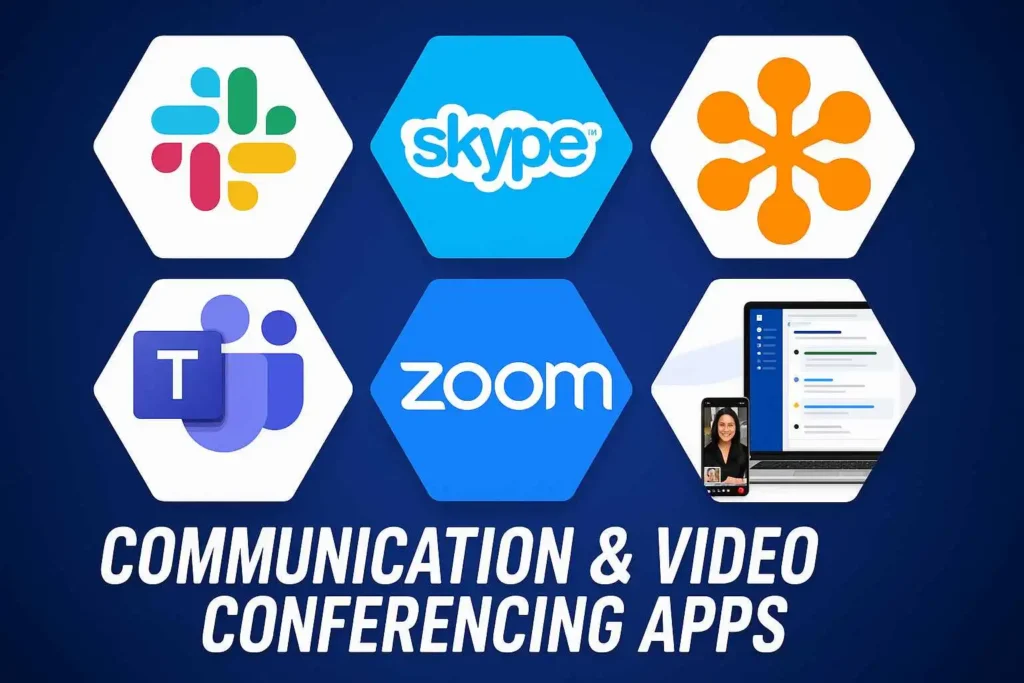
Having the right communication tools is crucial for small businesses to stay connected. Whether you’re collaborating with team members, clients, or freelancers, using an efficient and cost-effective platform ensures seamless interactions without juggling multiple subscriptions. Here’s a look at some of the best business communication and video conferencing apps to keep your team connected.
RingCentral Video Pro
RingCentral Video Pro is an all-in-one communication platform that combines team messaging, video conferencing, and collaboration tools in a user-friendly interface—completely free. Small businesses can host unlimited HD video meetings for up to 100 participants with a maximum duration of 50 minutes.
Slack
Slack is a real-time messaging and collaboration tool designed for teams that need instant communication. It eliminates excessive email exchanges by allowing users to send messages, share files, and integrate with third-party software like Google Drive and Trello. Whether you’re on a computer or mobile device, Slack keeps communication fast and organized, making it ideal for remote teams and startups.
Skype
Skype has been a trusted name in business communication for years. This app offers video conferencing, text messaging, file sharing, and screen sharing—all in one place. It allows businesses to host calls with up to 25 participants, making it a great choice for small teams that need reliable virtual meetings without additional costs.
Microsoft Teams
Microsoft Teams is a business-centric communication platform that integrates with Microsoft 365 tools, providing chat, video calls, and file-sharing capabilities. The free version includes basic features, while the premium plans offer advanced collaboration tools such as larger meeting capacities, cloud storage, and enhanced security. If your business already uses Microsoft’s ecosystem, Teams is an excellent choice for a streamlined workflow.
Zoom
Zoom has become the go-to platform for virtual meetings, webinars, and team collaboration. Known for its high-quality video conferencing, Zoom supports large meetings, screen sharing, breakout rooms, and real-time collaboration on projects. Whether you’re hosting a quick team check-in or a large-scale webinar, Zoom’s reliability and versatility keep teams connected efficiently.
GoToMeeting
GoToMeeting is a professional video conferencing solution offering unlimited HD video meetings, screen sharing, and dial-in conference lines. Businesses can integrate it with Google Calendar and Office 365, making it easy to schedule and join meetings from within their calendar app. With mobile accessibility, GoToMeeting allows professionals to host or attend meetings on the go, ensuring flexibility and productivity.
2 Best Free Finance Apps
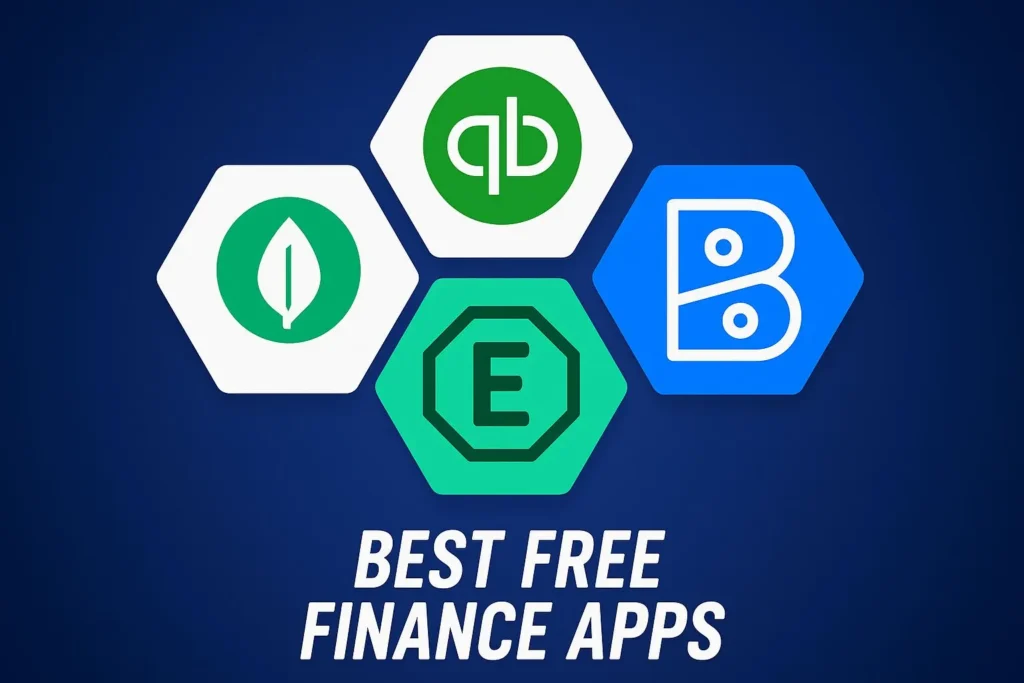
Stay in control of your finances with the best financial apps for budgeting, saving, and investing. Managing finances is one of the greatest challenges for small business owners. From tracking expenses to handling invoices, keeping everything organized can be overwhelming. Thankfully, there are free finance apps for small business owners that can help you stay on top of your business finances without spending a dime.
Wave – The Best Free Accounting & Invoicing Tools
Wave stands out as an exceptional free option. It combines accounting, invoicing, and receipt tracking into one easy-to-use platform, making it an ideal choice for freelancers, startups, and small businesses. Unlike other accounting software that requires a subscription, Wave offers completely free access to its core features without hidden fees.
One of its biggest advantages is the ability to send unlimited invoices to clients, helping businesses maintain a steady cash flow. Additionally, Wave makes it simple to track income and expenses, ensuring that business owners can monitor their financial health at all times. The app also provides an automatic bank transaction import feature, which saves time and reduces errors in bookkeeping.
Expensify – The Best Free App For Tracking Spending
Expensify, a free and user-friendly app, assists business owners in managing their expenses effectively. If you’re tired of losing receipts or struggling to track your spending, Expensify is the perfect solution. From snapping pictures of receipts to generating instant expense reports, it does all the hard work for you.
One of the best things about Expensify is how simple it makes receipt tracking. Just take a photo of any receipt, and the app will automatically pull important details like the date, amount, and vendor. No more typing everything in by hand! This feature saves time and keeps your records neat and organized.
Expensify also sorts your expenses into categories, which helps keep your books accurate and makes tax time much easier. You can create one-click expense reports that give you a quick summary of your spending—perfect for busy business owners who need immediate answers. Even better, Expensify works with popular accounting tools like QuickBooks and Xero. This means your expense data stays in sync with your accounting software, giving you a clear picture of your business finances at all times.
Whether you’re a solo entrepreneur or running a small business, Expensify helps you take control of your money with less stress and more confidence.
Quickbooks Online (Free Plan)
QuickBooks is a well-known name in the world of business finance management. While its premium plans offer advanced accounting features, the QuickBooks Online free plan provides essential tools for small businesses, making it a fantastic starting point for entrepreneurs.
With QuickBooks Online, users can track income and expenses effortlessly, ensuring they have a clear picture of their financial position. The app also allows users to sync their bank accounts, automating transaction updates and reducing manual data entry. This feature not only saves time but also minimizes errors in bookkeeping.
Mint – The Best App For Budgeting & Expense Management
Mint is one of the best free software tools available for managing finances, making it an essential asset for effective budgeting in any successful business. Designed to provide real-time financial insights, Mint helps business owners stay on top of their cash flow, expenses, and budgets.
One of Mint’s key features is its ability to create and track budgets based on real-time data. This helps businesses allocate funds efficiently and avoid unnecessary expenses. For those looking to improve their financial strategy, Mint also offers helpful budget ideas—such as setting category limits or monitoring monthly spending patterns—to support smarter decision-making.
The app also sends bill payment alerts and due date reminders, preventing late fees and ensuring that financial obligations are met on time. Another advantage of Mint is that it allows users to track multiple bank accounts in one place, providing a comprehensive view of business finances. This feature is particularly useful for small business owners who need to separate their personal and business expenses. By offering clear and actionable financial insights, Mint empowers business owners to make informed decisions—without the need for a dedicated accountant.
Zoho Books – The Best Free Alternative To Quickbooks
Zoho Books is an excellent alternative to QuickBooks for businesses seeking a free invoicing and accounting tool. Designed specifically for freelancers, startups, and small businesses, Zoho Books provides a user-friendly platform for managing business finances.
One of Zoho Books’ standout features is its free invoicing and expense tracking capabilities. This feature simplifies billing clients and monitoring expenses for business owners, eliminating the need for additional software. The app also allows users to automate financial workflows, increasing efficiency and reducing manual tasks.
3 Best Free Small Business Storage And Organization Apps
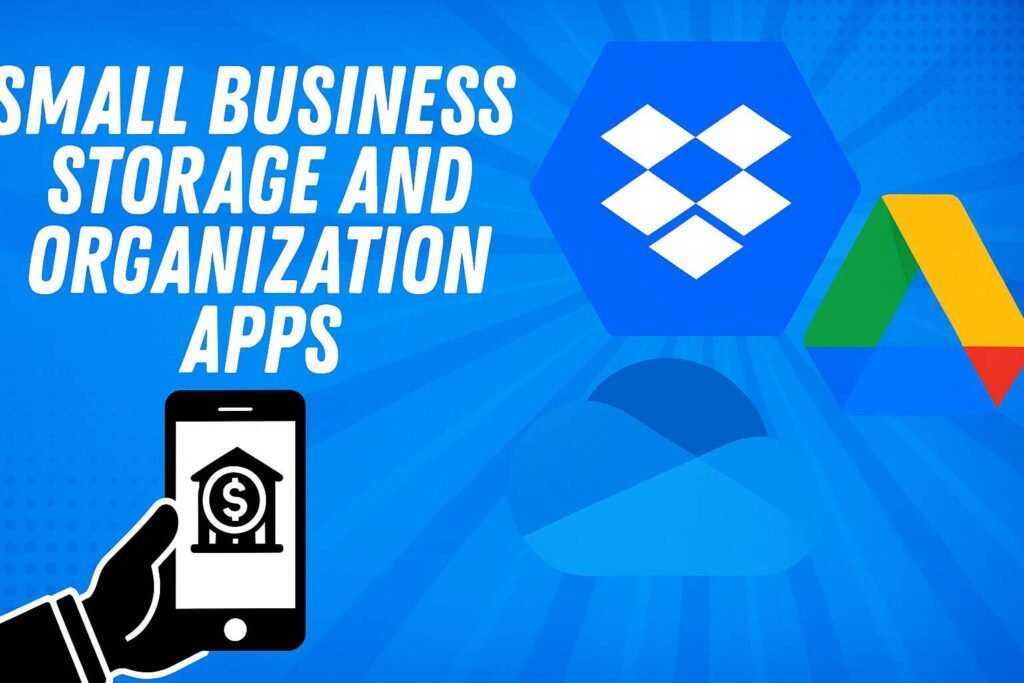
Streamline your business with the best free storage and organization apps designed for small businesses. In today’s digital world, file cabinets have moved to the cloud, but organizing and storing important business documents is just as essential as ever. The right storage apps can make life easier by ensuring quick and secure access to vital information. Here are some of the best free storage and organization apps for small businesses.
Google Drive
Google Drive is one of the most popular cloud storage solutions, known for its ease of use and seamless integration with Google Workspace. Whether or not your business relies on Google services, Drive remains a top choice due to its accessibility and collaborative features. Users can create, edit, and share documents, spreadsheets, and presentations in real time. Plus, it’s compatible across multiple devices, making team collaboration effortless.
Microsoft OneDrive
For businesses that work within the Microsoft ecosystem, Microsoft OneDrive offers a secure and efficient cloud storage solution. It integrates directly with Microsoft Office applications, allowing teams to collaborate on Word documents, PowerPoint presentations, and Excel spreadsheets without hassle. To use OneDrive, you’ll need a Microsoft account. The free version provides 5GB of storage, and if you need more, you can opt for one of their paid plans.
Dropbox
Dropbox has been a trusted name in cloud storage for years, known for its simple interface and cross-platform compatibility. Unlike Google Drive and OneDrive, Dropbox isn’t tied to a specific ecosystem, making it a flexible choice for businesses using various operating systems and tools. The free plan includes 2GB of storage, allowing users to store, sync, and share files effortlessly.
Each of these apps offers unique benefits, and the best choice depends on your business’s needs. Whether you prioritize seamless integration, ease of use, or cross-platform compatibility, these free storage solutions can help keep your business organized and running smoothly.
Related Article : Investiit.Com Tips: Best Tips For Smarter And Faster Investments
4 Payment Processing Apps
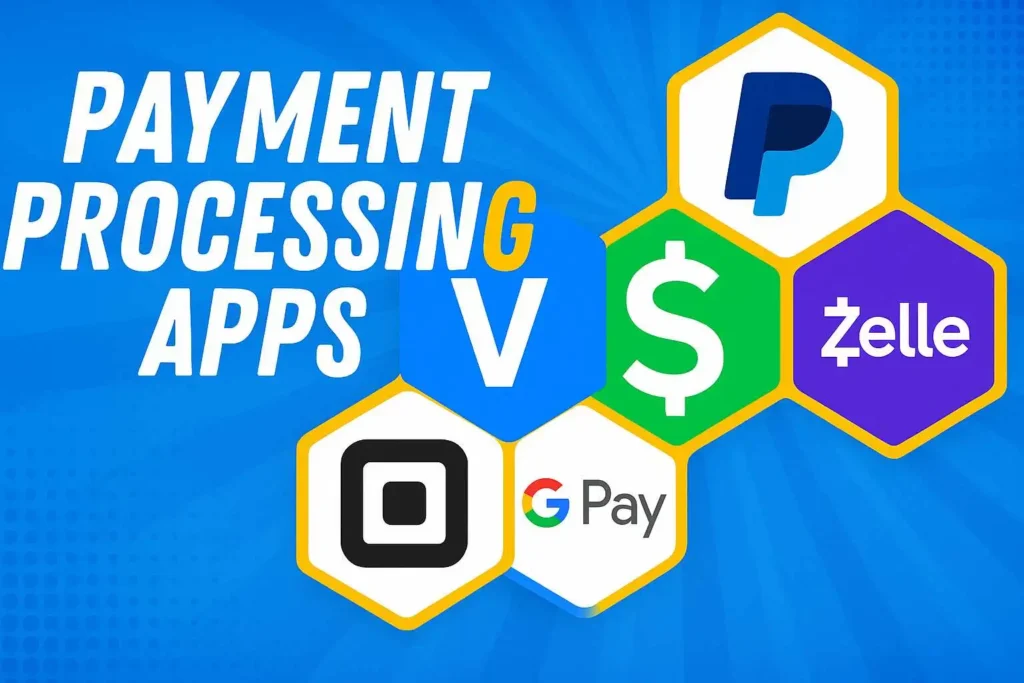
Payment processing apps are essential for small business owners who need to accept payments from customers quickly and securely. These apps allow businesses to process credit card transactions, mobile payments, and even online invoices with ease. Many of these tools come with no upfront costs, making them ideal for budget-conscious entrepreneurs.
Google Pay
Google Pay is a convenient and easy-to-use payment solution, especially for small businesses. It seamlessly integrates with Apple Pay, Samsung Pay, and PayPal, making transactions smooth and hassle-free. To accept payments, businesses need a contactless card reader and a UPI ID. For online purchases, it works through supported payment processors via Google’s API. With its quick setup, strong encryption, and instant payment notifications, it’s a secure option. However, it does require compatible devices and can sometimes run into technical issues.
Apple Pay
Apple Pay is a fast and secure payment option widely accepted across the U.S. It works with NFC card readers and even offers a “Buy Now, Pay Later” feature. Transactions are logged in real time, helping businesses track finances effortlessly. With top-tier encryption, instant tracking, and the convenience of Apple’s ecosystem, it’s a great choice. That said, it only works with Apple devices, has a somewhat complex setup, and may come with additional fees.
Venmo
Venmo makes payments easy with its built-in invoicing feature, helping small businesses save on processing fees. It ensures security with encryption and two-factor authentication. The platform is known for its simple invoicing, low fees, and secure transactions. However, some transactions come with high fees, payment tracking can be tricky, and extra security steps may be necessary.
Zelle
Zelle is perfect for businesses that need instant bank-to-bank transfers. It connects with over 1,100 banks, making transactions quick and seamless. Businesses benefit from fast payments, strong security, and easy tracking. However, not all banks support it, transfer limits can be restrictive, and there may be fees involved.
PayPal
With over 425 million users, PayPal is one of the most trusted payment platforms. It supports online, mobile, and even cryptocurrency transactions. Businesses love it for its security, ease of use, and integration with accounting tools like QuickBooks and Xero. However, it does come with high transaction fees, occasional payment delays, and additional international fees.
Cash App
Cash App offers a simple way to send, receive, and track payments. It features encrypted transactions and even supports Bitcoin transfers via the Lightning Network. With its user-friendly design and security features, it’s a solid choice for small businesses. The downsides? Limited acceptance at certain locations, transaction fees, and minimal customer support.
Square
Square is a powerful payment processing solution with no setup fees. It comes with built-in inventory tracking, employee management, and POS integration, making it ideal for small businesses. Its biggest strengths include fast transactions, easy inventory management, and an intuitive interface. However, it’s not the best option for high-volume businesses, has limited customer support, and may experience occasional glitches.
5 Project Management Apps
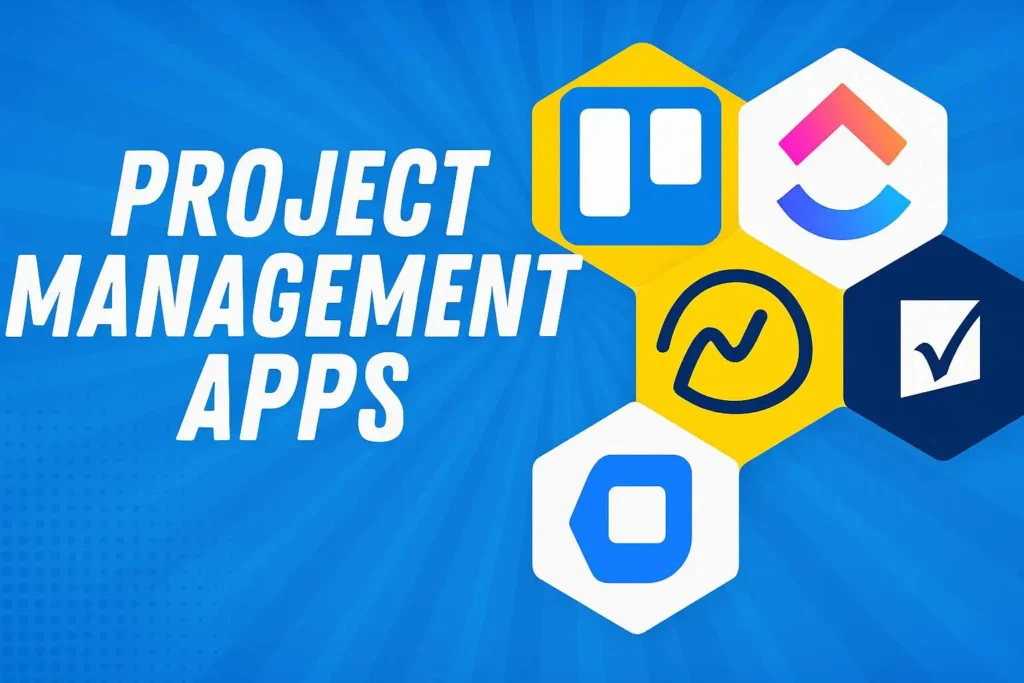
Choosing the right project management app can make a huge difference for small businesses by improving productivity, collaboration, and efficiency. With so many options available, it’s important to find one that fits your team’s workflow, budget, and specific needs. Whether you’re managing tasks, tracking deadlines, or collaborating with remote teams, the right tool can streamline your business operations.
Trello
Trello is a great choice for businesses that prefer a simple and visual way to manage tasks. Its drag-and-drop Kanban boards make it easy to organize projects, assign tasks, and track progress at a glance. However, it lacks advanced reporting and time-tracking features, making it better suited for small teams or individuals rather than complex projects.
If your team needs a more structured and collaborative approach, Asana is a powerful option. It allows teams to create tasks, set dependencies, and automate workflows. It’s especially useful for businesses managing multiple projects simultaneously. While it offers a free plan for up to 15 users, its vast number of features can feel overwhelming to new users.
Monday.com
For businesses looking for a highly customizable platform, Monday.com is an excellent choice. It allows users to create custom workflows, track project progress, and integrate with popular tools like Slack and Zoom. It’s especially useful for creative teams and marketing agencies that need flexibility. However, its paid plans can be costly for small businesses with tight budgets.
ClickUp
ClickUp is an all-in-one project management solution that combines task management, document collaboration, chat, and goal-setting. It offers a free plan with many advanced features, making it a strong choice for remote teams and freelancers. However, its feature-rich nature comes with a steep learning curve, which may require time for teams to fully adapt.
For those who prefer a more flexible, note-based workflow, Notion is a fantastic option. It allows teams to create customized workspaces, manage databases, and organize projects in one place. It’s highly adaptable for different business needs, but it lacks built-in time tracking, which may require integrations with other tools.
Basecamp
Basecamp is perfect for businesses that value simplicity over complexity. It provides to-do lists, team chat, file sharing, and document collaboration, all in one platform. Unlike many competitors, Basecamp offers flat-rate pricing instead of per-user fees, making it a cost-effective choice. However, it has limited third-party integrations, which could be a drawback for teams relying on multiple apps.
For growing businesses that need scalability, Wrike offers advanced reporting, real-time collaboration, and automation tools. It integrates with over 400 applications, making it a powerful tool for larger projects. However, due to its complexity, it might not be the best option for beginners or small teams just starting with project management software.
Smartsheet
Smartsheet is ideal for businesses that are used to working with spreadsheets but need more project management capabilities. Its Excel-like interface makes it easy to track budgets, assign tasks, and manage resources. However, it’s not as intuitive for creative teams who prefer a more visual approach.
For businesses working with clients and external teams, Teamwork is a great option. It comes with built-in time tracking, invoicing, and client collaboration tools, making it especially useful for agencies and service-based businesses. While it offers a free plan, some of its most valuable features require a paid subscription.
6 Customer Management Apps

Hubspot CRM – Best Free CRM For Small Businesses
If you’re a small business looking for a powerful yet budget-friendly way to manage customer relationships, HubSpot CRM is a top choice. It offers a completely free plan with essential tools like contact management, email tracking, pipeline visualization, and automation features. Its user-friendly interface makes it easy to organize customer data and streamline your sales process. Plus, it integrates smoothly with HubSpot’s marketing and customer service tools, allowing businesses to build a strong inbound marketing strategy.
If you need more advanced features, HubSpot also provides paid plans with enhanced automation and reporting tools, making it a scalable option as your business grows.
Zoho CRM – Best For Customization & Affordability
For businesses that need a highly customizable and budget-friendly CRM, Zoho CRM is an excellent pick. It comes loaded with advanced features like AI-powered sales insights, workflow automation, omnichannel communication (email, social media, live chat), and predictive analytics. Zoho’s AI assistant, Zia, helps analyze customer data and provides smart suggestions to close deals faster. One of the standout benefits of Zoho CRM is its flexibility—it allows businesses to customize fields, modules, and automation rules to fit their specific industry needs. If you’re looking for an affordable yet feature-packed CRM, Zoho is a solid option without the high costs of premium platforms.
Pipedrive – Best For Sales-Focused Businesses
If sales are your top priority, Pipedrive is built specifically to help businesses track leads and deals effortlessly. With its intuitive drag-and-drop sales pipeline, sales teams can easily visualize their progress and focus on high-value leads. Pipedrive also offers email integration, activity reminders, workflow automation, and AI-powered sales insights, helping teams close deals faster. Its biggest strength is simplicity—small sales teams can stay organized without dealing with complicated software. Plus, it integrates seamlessly with popular tools like Slack, Trello, and Zoom, ensuring smooth collaboration between sales and other departments.
Monday.Com CRM – Best For Project & Client Management
For businesses that want to manage both customer relationships and internal projects, Monday.com CRM is a great choice. Unlike traditional CRMs, it offers customizable workflows, allowing businesses to tailor the system to their needs. It comes with email tracking, lead management, sales automation, and a centralized dashboard, making it easy to track client interactions and projects in one place. Service-based businesses, agencies, and startups will particularly benefit from Monday.com’s team collaboration features. It also integrates with tools like Slack, Gmail, and Zoom, ensuring that communication stays seamless across your team.
Bitrix24 – Best All-In-One CRM With Team Collaboration
If you’re looking for a CRM that does more than just track sales, Bitrix24 is a complete business management suite. It combines customer relationship management, project management, internal communication, and automation tools into one platform. The free version is incredibly generous, offering features like lead tracking, task automation, built-in telephony, social media integration, and email marketing tools. Small businesses that need an all-in-one solution to manage sales, marketing, and team collaboration will find Bitrix24 invaluable. Its cloud-based system allows remote teams to stay connected, and it even supports eCommerce and website integrations, making it a strong choice for online businesses and service providers.
Read more : Pioneering Sustainable Technology For A Greener Future
7 Essential Free Marketing Tools To Grow Your Business
If you’re looking to streamline your marketing efforts without breaking the bank, these free tools can help you design eye-catching graphics, manage social media, optimize SEO, and track customer engagement. Here’s a roundup of must-have marketing tools that can give your business a competitive edge.
Canva – Easy Graphic Design For Stunning Visuals
Canva is a user-friendly graphic design tool that makes creating professional-looking visuals effortless. Whether you need social media posts, presentations, flyers, or business cards, Canva offers thousands of free templates, fonts, and stock images. With its simple drag-and-drop functionality, even beginners can design high-quality graphics. The free plan provides access to essential features, but some premium elements may require an upgrade. Available on the web, iOS, and Android, Canva is perfect for businesses looking to elevate their branding with minimal effort.
Mailchimp – Free Email Marketing For Small Businesses
Mailchimp is one of the best email marketing platforms for startups and entrepreneurs. Its free plan allows you to send up to 1,000 emails per month to 500 contacts, making it an excellent choice for growing businesses. You’ll get customizable email templates, basic automation, and performance analytics to track engagement. While advanced segmentation and automation features require a paid plan, Mailchimp remains a top-tier tool for building and managing effective email campaigns. It’s available on the web, iOS, and Android.
Buffer – Social Media Scheduling Made Simple
Managing social media can be time-consuming, but Buffer makes it easy to schedule posts in advance across platforms like Facebook, Instagram, Twitter, LinkedIn, and Pinterest. The free plan lets you schedule up to 10 posts per account and provides basic engagement analytics. If you need in-depth analytics and team collaboration features, you’ll have to upgrade to a paid version. Available on web, iOS, and Android, Buffer is a must-have tool for businesses looking to stay active online with minimal effort.
Google My Business – Boost Your Local Seo
If you want to improve your local search visibility, Google My Business (GMB) is essential. This free tool allows businesses to create and manage their listings on Google Search and Google Maps. You can customize your business profile, respond to customer reviews, add photos, and track engagement insights. Regularly updating your listing with fresh content can significantly improve your local SEO ranking. Available on the web, iOS, and Android, GMB helps businesses attract local customers efficiently.
Google Analytics – Understand Your Website Traffic
Google Analytics is a powerful tool that gives you deep insights into how visitors interact with your website. You can track demographics, traffic sources, bounce rates, and conversions to understand what’s working and what needs improvement. While setting up Google Analytics requires some technical knowledge, it’s an indispensable resource for businesses looking to optimize their online performance. Available on the web, this tool is a must for data-driven decision-making.
Hubspot CRM– Free Customer Relationship Management
HubSpot CRM helps businesses build and maintain strong customer relationships. The free plan includes contact management, email tracking, sales pipeline tracking, and meeting scheduling—making it easier to follow up on leads. While premium features like advanced reporting and automation require a paid plan, the free version is an excellent option for startups and small businesses looking to manage their customer interactions more effectively. HubSpot CRM is available on the web, iOS, and Android.
Trello – Organize Your Marketing Projects
Trello is an intuitive project management tool that helps teams stay organized. With its drag-and-drop interface, users can create boards, lists, and cards to track tasks efficiently. It’s perfect for managing blog content, social media schedules, and marketing campaigns. The free plan allows unlimited cards and members, though storage and automation options are limited. Available on the web, iOS, and Android, Trello makes project collaboration seamless.
Answer the public – Find Trending Topics For Content
Creating engaging content starts with understanding what people are searching for. AnswerThePublic is a keyword research tool that compiles search engine queries into topic clusters. This helps businesses generate content ideas based on real user questions. The free version has limited daily searches but is still a valuable resource for improving content strategy and boosting organic traffic. AnswerThePublic is available on the web.
Ubersuggest – Seo & Keyword Research Made Easy
Ubersuggest is a must-have SEO tool that helps businesses improve their search engine rankings. It provides keyword suggestions, backlink data, and competitor analysis to help optimize website content. While the free plan limits daily searches, it still offers valuable insights into high-ranking keywords and SEO strategies. If you’re looking to enhance your organic reach, Ubersuggest is a great tool to have in your marketing arsenal.
Conclusion
Running a small business comes with plenty of challenges, but the right tools can make a big difference. With these best free apps for small business owners on iOS, Android, Windows, and iPhone, you can simplify tasks, stay organized, and keep things running smoothly—without spending a dime. Whether it’s managing finances, communicating with your team, or marketing your brand, these Free business apps for Android help you work smarter, not harder. Give them a try and see how they can help your business thrive in 2025!

